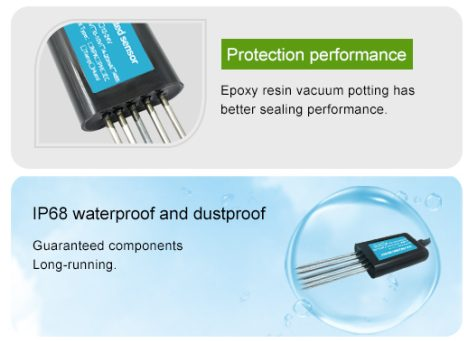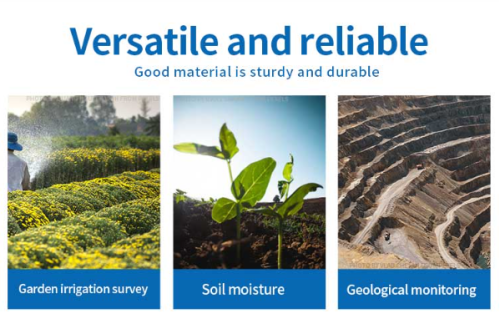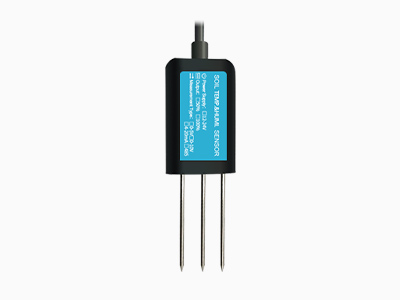Soil moisture meters is a valuable tool for measuring soil water content and provides important information for agriculture and garden environment. These devices play a vital role in optimizing irrigation practices, monitoring soil health. By utilizing sensor technologies, soil moisture meters enable users to make informed decisions regarding crop irrigation, soil fertility,. This essay will explore the significance of soil moisture meters, their working principles, applications, and the impact they have on sustainable agriculture and environmental stewardship.

The soil moisture meter is an essential instrument for assessing the water content in the soil, which is a critical factor influencing plant growth, crop yield, and overall soil health. By accurately measuring soil moisture levels, farmers, horticulturists, and researchers can determine the optimal timing and quantity of irrigation, preventing both under-watering and over-watering, which can have detrimental effects on plants and the environment.
Working principle of a soil moisture meter

The working principle of a soil moisture meter involves the use of sensors to measure the dielectric constant of the soil, which is directly related to its moisture content. Capacitance-based sensors are commonly used in soil moisture meters, as they can accurately determine the water content in the soil by measuring the electrical properties of the soil. When the soil is moist, it has a higher dielectric constant, whereas dry soil has a lower dielectric constant. By measuring the dielectric constant, soil moisture meters can provide precise readings of the water content in the soil.
Key advantages of soil moisture meters

One of the key advantages of soil moisture sensors is their ability to provide real-time, on-site measurements, allowing users to assess soil moisture levels directly in the field. This immediate feedback enables farmers and growers to make timely decisions regarding irrigation scheduling, ensuring that plants receive the appropriate amount of water to support healthy growth and optimal yield. Additionally, soil moisture meters can be used to identify areas of the field with varying moisture levels, enabling targeted irrigation and resource allocation.
Applications of soil moisture meters

The applications of soil moisture meters are diverse and far-reaching, encompassing various sectors such as agriculture, horticulture, environmental monitoring, and research. In agriculture, soil moisture sensor are optimize irrigation practices, conserve water resources, and enhance crop productivity. By providing accurate and reliable data on soil moisture levels, these devices enable farmers to implement precision irrigation strategies, reducing water waste and minimizing the risk of waterlogging or drought stress in crops.
In horticulture, soil moisture sensors are indispensable for maintaining optimal growing conditions for plants, particularly in greenhouse and nursery settings. By monitoring soil moisture levels, horticulturists can ensure that potted plants, ornamentals, and nursery stock receive the appropriate amount of water, promoting healthy root development and overall plant vigor. This precise control over irrigation contributes to the success of horticultural operations and the quality of plant products.
Environmental monitoring and research also benefit from the use of soil moisture sensors, as these devices provide valuable data for studying soil dynamics, hydrology, and ecosystem sustainability. By monitoring soil moisture content in natural ecosystems, researchers can gain insights into water availability, nutrient cycling, and the impact of climate change on soil moisture dynamics. This information is crucial for understanding the resilience of ecosystems and informing conservation efforts.
The impact of soil moisture meters
The impact of soil moisture meters on sustainable agriculture and environmental stewardship is significant. By enabling precise irrigation management, these devices contribute to water conservation, reduced energy consumption, and improved crop water use efficiency. Efficient irrigation practices, guided by soil moisture measurements, help mitigate water scarcity and contribute to the sustainable use of water resources in agriculture. Furthermore, by preventing over-irrigation, soil moisture sensor aid in minimizing nutrient leaching and the potential contamination of water bodies, thereby supporting environmental conservation efforts.
In conclusion, soil moisture sensors are indispensable tools for assessing soil moisture content, optimizing irrigation practices, and promoting sustainable water management in agriculture, horticulture, and environmental monitoring. Their ability to provide accurate, real-time measurements of soil moisture levels empowers users to make informed decisions that benefit crop productivity, water conservation, and environmental sustainability. As the importance of efficient water use and environmental s
